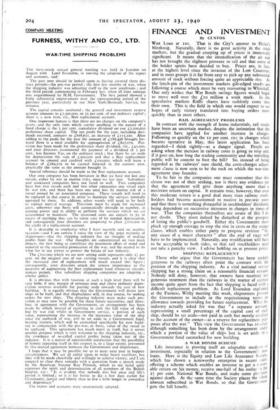COMPANY MEETING
FURNESS, WITHY AND CO., LTD.
WAR-TIME SHIPPING PROBLEMS THE forty-Moth annual general meeting was held in London on August loth. Lord Essendon, in moving the adoption of the report and accounts, said:
The past year should be looked upon as having covered three dis- tinct periods—the pre-war period ; the first few months of war, when the shipping industry was adjusting itself to the new conditions ; and the third period, commencing in February last, when all liner tonnage was requisitioned by H.M. Government. The first period showed a fairly substantial improvement over the corresponding period of the previous year, particularly in our New York-Bermuda Service, for instance.
The capital remains unaltered ; the general and investment reserve account amounts to £1,500,000, or 25 per cent. of our ordinary capital ; there is a new item, viz., fleet replacement account.
One important feature is that there are no charges on the company's assets, and the only item which carries anything in the nature of a fixed charge is the 5 per cent. cumulative dividend on our £I,Soo,000 preference share capital. The net profit for the year, including divi- dends received, amounts to £618,651, an increase of £113,500. After adding to the profit for the year the amount of £188,428 brought for- ward there is a total available for appropriation of £807,079. Pro- vision has been made for, the preference share dividend, viz., £45,000, and your directors recommend the payment of a dividend of 5 per cent., less Income Tax, on the ordinary stock ; that there be set aside for depreciation the sum of £3oo,000 and that a fleet replacement account be created and credited with £loo,000, which will leave a balance of £189,579 to be carried forward to the current year, practically the same as the amount brought in.
Special reference should be made to the fleet replacement account.
Our own company has been fortunate in that we have not lost any vessels, either by war or marine risks, since we last met. Subsidiary and associated companies have not fared so well. Two companies have lost two vessels each and two other companies one vessel each by war risk, and there has been one total loss by marine risk of a vessel owned by an associated company. These vessels will need to be replaced in due course in order to maintain the services normally operated by them. In addition, other vessels will need to be built to replace normal wastage. Provision must be made for increased costs, otherwise our fleets will automatically dwindle in number, in earning power and in ability to perform the set vices which we are accustomed to maintain. The increased costs are certain to be in excess of anything that can be taken care of by normal depreciation, and consequently your directors are proposing to place Doo,000 to the credit of a replacement account.
It is desirable to emphasise what I have recently said on another occasion—and I am certain I voice the view of the great majority of shipowners—that the shipping industry has no thought of making profits from the war. Our thoughts are concentrated on two main objects, the first being to contribute the maximum effort of mind and material to the successful prosecution of the war, and the second to do what lies in our power to protect the future of our industry.
The £too,000 which we are now setting aside represents only 21 per cent. on the original cost of our existing vessels, and it is clear that the increased cost of replacement will much exceed this figure ; consequently, your directors attach the utmost importance to the necessity of augmenting the fleet replacement fund whenever circum- stances permit. Our subsidiary shipping companies are adopting a similar policy.
It is obvious that with taxation at such a high level there will be very little, if any, margin of earnings over and above ordinary depre- ciation reserves available for putting aside towards the cost of new building. It is equally obvious that the Government will desire new ships to be built, and that shipbuilders will, in due course, be seeking orders for new ships. The shipping industry must make such pro- vision as may now be possible for these future necessities, and there- fore, in agreement with the Government, an arrangement has been made by which instead of receiving in cash the full value of ships lost by war risk whilst in Government service, a portion of such value, representing the increase in the insurance value of the ship since the outbreak of war, will be set aside in a Government fund, bearing interest, which will be earmarked specifically for new build- ing in conjunction with the pre-war, or basic, value of the vessel to be replaced. This agreement has much merit in itself, but it serves another purpose which is very welcome to the shipping industry, viz., the avoidance of so-called capital profits being taken out of the industry. It is a matter of considerable satisfaction that the possibility of history repeating itself in this respect is, to a large extent, prevented by this mutual agreement between the Government and shipowners.
I hope that it may be possible for us to meet next year in happier circumstances. We are all called upon to make heavy sacrifices, but they will be made cheerfully and willingly to achieve victory, and I am tempted to close these remarks with a quotation from a speech made by the American Senator Key Pittman, which to my mind aptly expresses the spirit and determination of all members of the British Empire, viz.: " It is evident that nobody dies but once and life's period is limited ; so it is far better to die a few days earlier for Christianity, justice and liberty than to live a little longer in cowardice - and degeneracy."
The report and accounts were unanimously adopted.






























 Previous page
Previous page